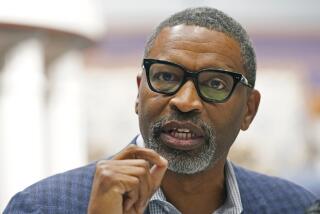A Quarterback for the NAACP Team 2000 : Evers-Williams needs to move the group toward the middle. Who better than a Republican?
- Share via
Congratulations to Myrlie Evers-Williams, the new chairwoman of the National Assn. for the Advancement of Colored People. Yet the euphoria that greeted her election Saturday will soon subside, leaving her the burden of healing an organization with a $4-million debt, racked by allegations of corruption and sexual harassment. With her leadership skills, however, and her credibility stemming from four decades in the civil-rights movement, she can overcome those challenges.
But those are the easy problems. The real work ahead is rethinking the mission of the NAACP. If the goal of the organization--equal justice for all--must never change, surely it’s time to reconsider the techniques to achieve that goal. Put bluntly, the two approaches that the NAACP most relies on, more government spending and affirmative action/quotas, are no longer viable. Not only have they failed to work as promised, but even if they did, they are about to be overwhelmed by the conservative counterrevolution against Big Government. And it’s not just Republicans; Democrats across the country, from Bill Clinton on down, have made it clear that they are open to “compromise” on these issues.
That leaves the NAACP as one of the few remaining bastions of old-style liberalism. Yet even within the black community, a painful split has opened up between those who have been folded comfortably into society and those still left out, who have been spindled and mutilated by crack, crime and dependency.
So what should the NAACP do? A lesson in what not to do came from the brief career of former executive director Benjamin Chavis. Chavis wanted to make the NAACP “relevant” to the gritty reality of life on the street. Unfortunately, he moved the group in a radical direction, away from the mainstream, cuddling up with Louis Farrakhan and urban gangs. One of Evers-Williams’ first tasks is to find a replacement for Chavis. It is also her first big opportunity to send a message to the country that the NAACP means to be a player in the Newt ‘90s.
No doubt Evers-Williams is getting lots of unsolicited resumes. But here’s a name she might not have considered: Jack Kemp. Yes, the former congressman, former housing secretary, and--gulp!--current Republican. Admittedly, it’s a stretch; Kemp is, after all, white. But the NAACP’s goal of equal justice ought to override preoccupations with skin color. In the glory days of civil rights in the late 1950s and early ‘60s, the movement was biracial. Kemp, who has an impeccable record on issues of tolerance, would also help the NAACP restore its relations with the Jewish community. As author Jonathan Kaufman records in his book “Broken Contract: The Turbulent Times Between Blacks and Jews in America,” Jews were present at the creation of the NAACP and until recently were full partners in the civil-rights cause. Today it is all the more important to transcend ethnic separatism.
Kemp believes that new ideas, combined with hope, can provide the transcendence we need. Since the late ‘70s, he has been preaching the gospel of economic salvation--entrepreneurship, enterprise zones and capital-gains tax cuts. Kemp’s supply-side message helped change America and the world; from Washington to Beijing to Moscow, people are talking capitalism. And yet those that Kemp most wanted to help--the poor--have been left out of the revolution, mired, as Kemp puts it, in “bureaucracy and socialism.”
Fortunately, Kemp, with his Hubert Humphrey-like enthusiasm and the same gift of gab, never gives up. He’s still stumping the country, proclaiming that only the free market can create the rising tide that will lift all African American boats. Even liberals who disagree with Kemp’s economic prescriptions agree that his heart is in the right place. Indeed, Kemp’s eagerness to empower the poor marginalized him within the GOP even before his opposition to the immigrant-targeting Proposition 187 finished him off inside the party. He recently announced that he would not seek the 1996 Republican nomination.
So Kemp has no time commitments beyond the lecture circuit. Would he take the NAACP job if it was offered to him? He doesn’t need the money, but he does need a great mission to cap his career. As Kemp always said when he visited public-housing projects in the Bush years: “I wasn’t at the lunch counter or at the march on Washington, but I’m here now.” If Evers-Williams were to reach out to Kemp, he would surely return the embrace.
More to Read
Sign up for Essential California
The most important California stories and recommendations in your inbox every morning.
You may occasionally receive promotional content from the Los Angeles Times.













